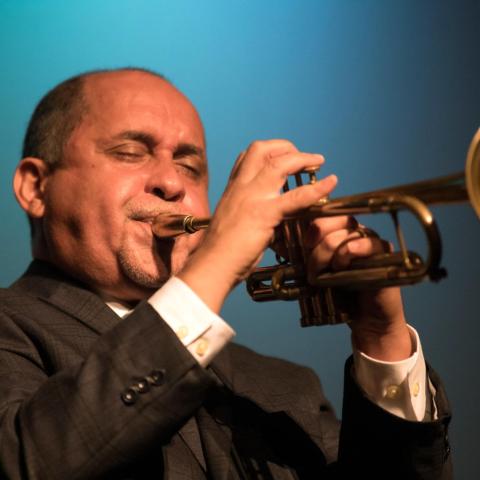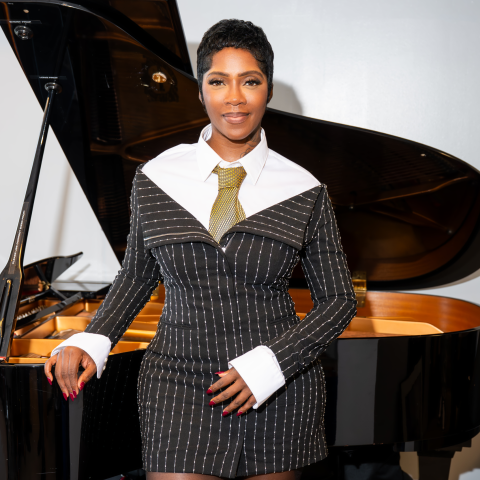Faculty Profile: Daniel Ian Smith

Associate Professor Daniel Ian Smith
Phil Farnsworth
Saxophonist and Associate Professor of Harmony Daniel Ian Smith remembers that the first day of his graduate studies with his musical hero Jimmy Giuffre got off to a rocky start. Smith recalls putting his horn together and honking the mouthpiece to make sure the reed was seated properly. “Are you gonna make music with that thing?” Giuffre asked. Confused, Smith explained that he was just checking to see whether the reed worked. Giuffre told him that if he wanted to know whether the reed was suitable for making music, he should test it by making music.
Giuffre insisted that every aspect of Smith’s playing be musical and assigned him to spend the first week of his studies playing only a middle G. Satisfied with his progress, Giuffre allowed his student to spend the second week playing G and A. The exercise taught Smith to consider each note as a musical statement unto itself, a value he imparts to his students.
“One note can do it,” he insists. “When I was at Schenectady [County Community College], the guest conductor took a student’s violin and played one note that blew my mind. I felt things from just that one note. Music is where the tangible world connects with the intangible. And I love that; I love bringing music to people.”
Whether playing a festival alongside McCoy Tyner, Mulgrew Miller, and Jack DeJohnette; organizing a concert series in Boston; or teaching extra classes on a Saturdays, Smith values every music-related experience. He attributes that outlook to growing up in rural New York State. “I had a summer job throwing 80-pound hay bales,” he recalls.“That has a way of inspiring reflection.” For Smith, it underscored the importance of seriously cultivating his musical gifts.
Since earning his undergraduate degree from Ithaca College and a master’s from New England Conservatory, Smith has spent a lot of time bringing music to people. For more than 10 years, he produced a series of jazz concerts at the Church of the Redeemer in Brookline, MA. “When I first moved [to Boston],” Smith says, “I was mystified that there were so few places to play. Rather than complaining about the situation, I decided to do something about it.”
Smith created the Jazz in the Sanctuary Concert Series that has featured such outstanding artists as Paul Bley, Marty Ehrlich, Steve Slagle, and Robert Moses. Other than piano-tuning expenses, all concert proceeds have gone to the musicians. When the Massachusetts Department of Conservation and Recreation recently renovated a band shell in Smith’s neighborhood, they asked Smith to establish a music festival to inaugurate the rejuvenated space. The renovation costs, however, left no funds for programming. With little time and no budget, Smith drew on his contacts at Berklee and in the Boston music scene as well as his own funds to launch the inaugural Hyde Park Jazz Festival on Labor Day weekend.
Smith is currently in the midst of a publicity blitz for the new CD Transitions by his group the New World Jazz Composers Octet. “The business side of things isn’t my favorite aspect of music,” he says. “But like hefting hay bales, it has to get done.” Despite Smith’s disinclination for publicity and marketing, Transitions will receive reviews in All about Jazz, JazzTimes, and DownBeat magazines in three consecutive months this fall.
The disc features nine compositions by several of the band’s members. Smith invited the musicians to stay after the recording sessions and freely improvise short pieces. Smith and Ted Pease, the project’s coproducer and former Berklee faculty member, used some of these improvisations as interstitials between songs on the CD. The connections between pieces are more serendipitous than planned, and Smith was pleased to feature the musicians in this way. “I didn’t want everybody to get lost in the arrangements,” he says, “I wanted to make sure listeners could hear how talented and inventive these players are.”
A series of events in Smith’s personal life—a traumatic skiing accident, the birth of his daughter, and his wife’s victory over cancer—has sharpened his focus on the value of a balanced life.
“I’ve thought more carefully about the balance I strike between my music and family time,” Smith says. “As musicians, it’s easy for us to get lost in what we do, but it’s important to resist that temptation. You’ve got to focus on your priorities.” For his part, Smith now takes on only those musical projects that he considers artistically rewarding.
This fall he traveled to Xalapa, Veracruz, Mexico, for the JazzUV festival, where he served as an artist in residence and performer. In May 2011, he will travel to Mozambique with Associate Professor Winnie Dahlgren for two weeks of teaching and performances.
Next spring, Smith will take his first-ever sabbatical to study the construction of melody and the varied melodic vocabularies of contemporary music: pop, jazz, and avant-garde. Smith will use the time to improve his writing. “In the groups I’ve put together, I’m primarily an interpreter of other people’s music. [I’m continually asked] to write for the group, but the other composers’ pieces are so wonderful that I keep wanting to just play those. But it’s important for me to push my writing. This will help me extend what I can do. And besides, it’s going to be really fun.
“I tell my students to try new things. I tell them to go work on something they’re not good at to see if they can add it to their skills,” he says. “This [sabbatical] is a chance to do that sort of thing myself.”
Adam Renn Olenn is the website producer in Berklee’s Office of Institutional Advancement.




